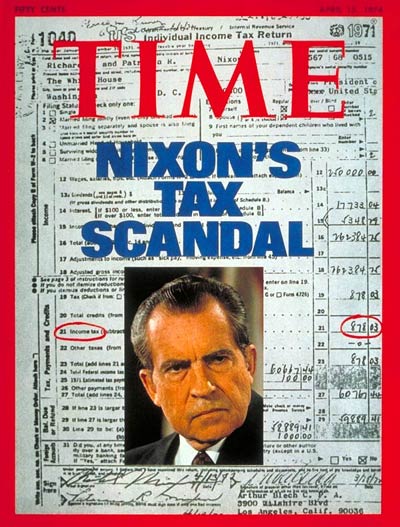
In the introduction to a headline-making episode Tuesday of her MSNBC show in which she revealed the contents of one of Donald Trump’s old tax returns, Rachel Maddow had cause to remind audiences of a particular presidential one-liner from American history: the moment in November of 1973 when President Richard Nixon told the American people, “I am not a crook.”
Though Nixon was already embroiled in the Watergate scandal that would lead to his downfall and the line was widely interpreted as a reflection of that situation — the break-in that started everything took place in 1972, and Nixon had been questioned about that too — the line came in response to something else. At an editors’ conference, a journalist named Joseph Ungaro asked whether the President’s taxes had been accurately reported. “The people have to know whether or not their President is a crook,” Nixon responded. “Well, I am not a crook. I have earned everything I’ve got.”
The question of Nixon’s taxes was the subject of a TIME cover story early the following year — a cover that Maddow displayed to viewers on Tuesday night. As Maddow noted to viewers, the questioning of Nixon’s tax situation was fruitful for investigators, a situation that TIME explained:
The President, when the IRS is concerned, I assure you, is just another citizen and even more so.
President Richard Nixon offered that wry observation exactly one month ago, when advance warnings had been posted that he might owe half a million dollars in back taxes. Last week Citizen Richard Nixon learned exactly how much “even more so” could add up to. On Tuesday afternoon, three agents of the Internal Revenue Service journeyed to the White House to present him with a bill of $432,787.13, for back taxes for the four years 1969-72, plus an undisclosed amount of interest due that could make the total he owes as high as $460,000. A day later the staff of the Congressional Joint Committee on Internal Revenue Taxation published its own independent estimate of Nixon’s tax and interest liabilities. It was remarkably close to the IRS calculation: $476,431.
Neither agency nor committee made any accusation of fraud on the part of the President and, as good as his word when he invited the committee to audit his returns last December, Nixon promptly declared that he would pay the IRS bill. His present tax lawyers, Kenneth W. Gemmill and H. Chapman Rose, dissented from that decision, arguing that if permitted to contest the IRS findings through the courts, they could significantly reduce the amount. Most tax experts agree, but that course was clearly not open to the nation’s No. 1 taxpayer at a time when he is fighting to avoid impeachment and keep his office. As one presidential aide explained: “His position was that he had promised to abide by the committee’s recommendations—and that was it. There never was any question. It was more important to keep his word, even if it hurt. And let me tell you, it hurt.”
Nixon, as the story noted, enjoyed the “dubious distinction” of being the first sitting President ever to be audited by the Congressional Joint Committee on Internal Revenue Taxation. The investigation generally concluded that, though Nixon had not properly paid his taxes, his owing money did not mean he had purposefully committed fraud. Nevertheless, amid the larger atmosphere of scandal, Nixon’s assertion that he was not a crook would go down as a one of the most infamous statements of presidential history.
As TIME put it in that cover story, “the White House doubtless wishes that somehow the books could be snapped shut as decisively and relatively cleanly on Watergate as they were last week on the President’s tax problems. Of course, they cannot be.”
Read the full story here in the TIME Vault: Nixon’s Tax Scandal
More Must-Reads From TIME
- The 100 Most Influential People of 2024
- Coco Gauff Is Playing for Herself Now
- Scenes From Pro-Palestinian Encampments Across U.S. Universities
- 6 Compliments That Land Every Time
- If You're Dating Right Now , You're Brave: Column
- The AI That Could Heal a Divided Internet
- Fallout Is a Brilliant Model for the Future of Video Game Adaptations
- Want Weekly Recs on What to Watch, Read, and More? Sign Up for Worth Your Time
Write to Lily Rothman at lily.rothman@time.com